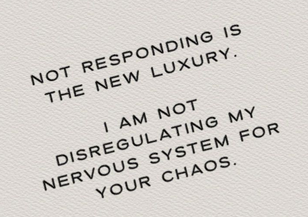It amazes me that people call others "hateful" for speaking up for their right to safe boundaried spaces. You have no idea what another individual's
It amazes me that people call others “hateful” for speaking up for their right to safe boundaried spaces.
You have no idea what another individual’s personal, mental, or physical health needs are. What their unique special needs and accommodations are. And it is not our business.
💔 12% of the U.S. population lives with a disability.
But the National Crime Victimization Survey reveals something far more chilling:
26% of violent crime victims are people with disabilities.
That’s not a small gap.
That’s a systemic failure.
And it gets worse:
🔺 People with disabilities are 3 times more likely to experience assault, manipulation, or abuse in their lifetime.
🔺 This includes physical violence, sexual assault, financial exploitation, coercive control, and emotional harm.
Let’s be real:
It’s not the disability that makes someone more vulnerable.
It’s society’s neglect. The isolation. The underfunded protections.
The disrespect. The silence. The refusal to see disabled people as fully human, fully deserving of safety, autonomy, and dignity.
⚠️ It’s Time to Confront These Truths:
People with disabilities are often dependent on others for transportation, communication, daily care, or housing—creating dangerous power imbalances.
Reporting abuse is harder when gatekeepers don’t listen, when abusers control access to phones, money, or freedom.
Women and girls with disabilities face the highest risk—and are the least believed.
💬 What We Must Say Loudly:
Disabled people are not “broken.”
Abuse is not “misunderstanding.”
Silence is not protection—it’s participation.
💡 If You’re a Safe Adult, Ask Yourself:
Does my language affirm disabled people’s rights to boundaries, privacy, and freedom from harm?
Do I assume that abuse “can’t happen” in certain settings?
Am I willing to believe someone—even if they communicate differently, move differently, or trust me with fragmented truths?
✨ The fight for justice is incomplete if it leaves disabled people behind.
And the movement to end violence is hollow if it ignores the ones most harmed.
We must make space for these stories.
We must build protections that work.
And we must hold accountable those who hurt the very people who rely on us most.
🛑 Disability does not mean expendable.
🛑 Disability does not mean voiceless.
🛑 Disability does not mean without rights.
It means we need to show up louder, better, and with our eyes wide open.
